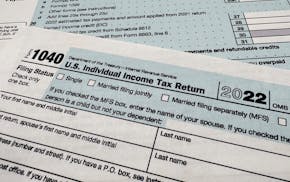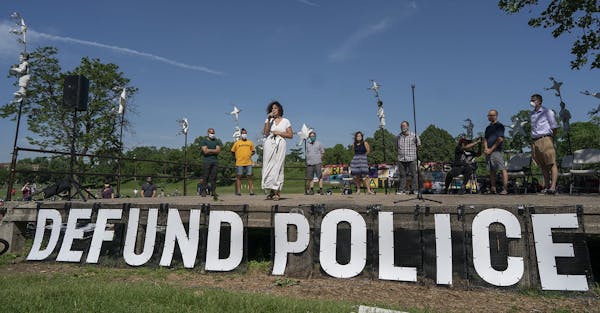Minneapolis voters would decide in November whether to eliminate the City Charter's requirement for police staffing and replace it with a new department "to provide for community safety and violence prevention," under a proposal floated Friday by five City Council members.
The announcement comes at a time when council members are facing pressure to explain their plan to "begin the process of ending" the Minneapolis Police Department following George Floyd's death.
The council and a separate body, the Minneapolis Charter Commission, would need to work under an expedited schedule as they face a tight deadline to add items to the November ballot. The city's charter, in essence its constitution, requires the City Council to fund a minimum number of police officers.
Council Member Jeremiah Ellison said he still expects to spend a year seeking feedback from residents about how they want to change the Minneapolis Police Department, but he fears that if that charter provision isn't removed, it will hamper their efforts.
"Without it, we can't actually have an earnest yearlong conversation with community that will mean anything," Ellison said. "And by making this change, it doesn't eliminate the police. … Until we have an emergency response system that is ready to deploy, we're going to have police in its place."
Minneapolis' charter requires the City Council to "fund a police force of at least 0.0017 employees per resident, and provide for those employees' compensation." Based on the latest census data, that amounts to roughly 730 police employees. The department had 892 sworn officers and 175 non-sworn employees at the beginning of the month.
During Friday's council meeting, Ellison and four other members — Alondra Cano, Cam Gordon, Steve Fletcher and Council President Lisa Bender — announced plans to introduce on June 26 a plan to amend the City Charter. Their proposal would remove the police department requirement and create a new department "to provide for community safety and violence prevention."
Gordon said they have discussed possibilities but haven't yet settled on the wording of the measure. "I don't know that there is necessarily a consensus among the authors," he said.
After the proposal is introduced, they will need seven council members to vote to refer the matter to the Charter Commission. If it chooses, the commission can take several months to review the proposal.
After they receive the Charter Commission's recommendations, which are not binding, council members must then vote on whether to send the measure to the ballot. Mayor Jacob Frey would also need to approve or veto the proposal. The deadline for completing all of that this year is Aug. 21.
"The Charter Commission, to be frank, probably could sort of use their process to obstruct this action," Ellison said. "My hope is that they won't."
Barry Clegg, chair of the Charter Commission, said it was too early to tell where commission members fall on the issue, but he would be willing to convene a special meeting.
If they do not meet the deadline for getting the item on the Nov. 3 ballot, council members could try again next year to get the measure on the 2021 ballot, an idea Gordon said he is open to.
In the days following George Floyd's death, many activists called for Minneapolis to "defund" or abolish its police department, but some business groups and Frey have said they prefer changing the department over eliminating it completely. In recent days, some business owners have said they need more clarity from the City Council on its future plans before they decide whether to rebuild from the riots.
Separate from a new charter proposal, the City Council on Friday unanimously approved a resolution that declares its "intent to create a transformative new model for cultivating safety in our city." That resolution creates a work group of city staffers who are tasked with recommending policy changes for transitioning to a new approach and for seeking community input during that process.
Also Friday, the council voted to remove the requirement for off-duty officers to work at some special events, allowing organizers to use private security. And it ended the state of emergency that was declared following George Floyd's death. An earlier emergency, put in place to respond to the coronavirus pandemic, remains in effect.
Later Friday, Frey announced that he is also convening three task forces to recommend new policies. One group will involve "national partners," including the National Network for Safe Communities at the John Jay College of Criminal Justice at City University of New York; Cities United; Prevention Institute; the NAACP, and the American Civil Liberties Union.
Another group will consist of local government agencies, including Hennepin County, the Hennepin County Public Defender's Office and Metro Transit Police.
A third group will consist of "community partners." More details are expected next week.
Liz Navratil • 612-673-4994
New Minnesota GOP leaders seek peace with party's anti-establishment wing

Who is Republican Lisa Demuth, Minnesota's first House speaker of color?

Minnesota House GOP, Secretary of State Steve Simon return to Supreme Court
Supreme Court sides with DFL and Simon, says 68 House members needed for floor action

